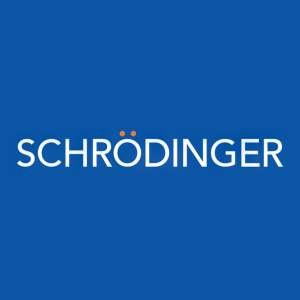Schrödinger Reports Preclinical Data Supporting Advancement Of Its MALT1 Inhibitor Program At American Society Of Hematology 2021 Annual Meeting
Schrödinger, Inc. (SDGR) presented promising preclinical data on its MALT1 inhibitors for treating B-cell lymphomas at the American Society of Hematology Annual Meeting. The data indicate strong anti-tumor activity across various models and highlight the combination potential with existing therapies like ibrutinib. The company aims to submit an Investigational New Drug Application to the FDA in the first half of 2022, potentially expanding treatment options for patients with specific B-cell lymphomas, including ABC-DLBCL and MCL.
- Strong anti-tumor activity demonstrated in multiple tumor models.
- Potential combination with ibrutinib to overcome drug resistance.
- On track to submit IND application to FDA in 1H 2022 for MALT1 inhibitors.
- None.
Insights
Analyzing...
Data Highlight Strong Anti-Tumor Activity Across Multiple Tumor Models and Combination Potential with Other Agents
On Track to Submit Investigational New Drug Application for MALT1 Development Candidate to the
“We are pleased that our data strongly underscore the therapeutic potential of our MALT1 inhibitors and present an opportunity to advance a potential best-in-class MALT1 inhibitor into the clinic,” said
The data presented suggest that targeting MALT1 may expand therapeutic options for patients with selected B-cell lymphomas, such as activated B-cell (ABC) subtype of diffuse large B cell lymphoma (DLBCL), with the possibility of expanding into other B-cell lymphomas such as mantle cell lymphoma (MCL). Furthermore, these small molecule MALT1 inhibitors demonstrate potential in combination with Bruton’s tyrosine kinase (BTK) inhibitors to overcome drug-induced resistance in patients with relapsed/refractory B-cell lymphomas.
Additional Details About the Study
The presentation, “Characterization of Potent Paracaspase MALT1 Inhibitors for Hematological Malignancies,” highlighted preclinical data with multiple lead molecules discovered using Schrodinger’s proprietary physics-based free energy perturbation (FEP+) modeling technology. These molecules demonstrate potent inhibition of MALT1 enzymatic activity and anti-proliferative activity in the ABC-DLBCL cell lines, such as OCI-LY3 and OCI-LY10. In combination with approved agents, these inhibitors demonstrate strong combination potential with Bruton’s tyrosine kinase (BTK) inhibitors such as ibrutinib in ABC-DLBCL cell lines. In ABC-DLBCL cell line-derived xenograft (CDX) models, the company’s representative MALT1 inhibitor induces tumor regression as a single agent and complete tumor regression in combination with ibrutinib. The representative MALT1 inhibitor, when tested in LY2298 patient-derived xenograft (PDX) models, demonstrates similar results. In addition, the representative MALT1 inhibitor was explored in a CDX model derived from a mantle cell lymphoma REC-1 cell line, and demonstrates strong anti-tumor activity of ~
About Schrödinger
Schrödinger is transforming the way therapeutics and materials are discovered. Schrödinger has pioneered a physics-based software platform that enables discovery of high-quality, novel molecules for drug development and materials applications more rapidly and at lower cost compared to traditional methods. The software platform is used by biopharmaceutical and industrial companies, academic institutions, and government laboratories around the world. Schrödinger’s multidisciplinary drug discovery team also leverages the software platform to advance collaborative programs and its own pipeline of novel therapeutics to address unmet medical needs.
Founded in 1990, Schrödinger has over 500 employees and is engaged with customers and collaborators in more than 70 countries. To learn more, visit www.schrodinger.com and follow us on LinkedIn and Twitter. Visit our blog at Extrapolations.com.
Cautionary Note Regarding Forward-Looking Statements
This press release contains forward-looking statements within the meaning of The Private Securities Litigation Reform Act of 1995 including, but not limited to those regarding the expected timing of an IND submission for Schrödinger’s MALT1 inhibitor program, the favorable properties of the MALT1 inhibitors the company has identified, the potential of MALT1 inhibitors to be used for the treatment of certain B-cell lymphomas and for chronic lymphocytic leukemia, and the potential for Schrödinger’s MALT1 inhibitors to be used in combination with other therapies. Statements including words such as "anticipate," "believe," "contemplate," "continue," "could," "estimate," "expect," "intend," "look forward," "may," "might," "plan," "potential," "predict," "project," "should," "target," "will," "would" and statements in the future tense are forward-looking statements. These forward-looking statements reflect Schrödinger’s current views about its plans, intentions, expectations, strategies and prospects, which are based on the information currently available to the company and on assumptions the company has made. Actual results may differ materially from those described in these forward-looking statements and are subject to a variety of assumptions, uncertainties, risks and factors that are beyond Schrödinger’s control, including the uncertainties inherent in early stage drug development, including the conduct of research activities, the initiation and completion of preclinical studies and clinical trials; uncertainties as to the availability and timing of results from preclinical studies; the timing of and the company’s ability to submit and obtain regulatory approval for investigational new drug applications; whether results from preclinical studies will be predictive of the results of later preclinical studies and clinical trials, as well as the other risks and uncertainties identified under the caption "Risk Factors" and elsewhere in the company’s
View source version on businesswire.com: https://www.businesswire.com/news/home/20211211005003/en/
Investors:
Schrödinger, Inc.
jaren.madden@schrodinger.com
617-286-6264
Media:
Schrödinger, Inc.
tracy.lessor@schrodinger.com
617-519-9827
Source: Schrödinger







